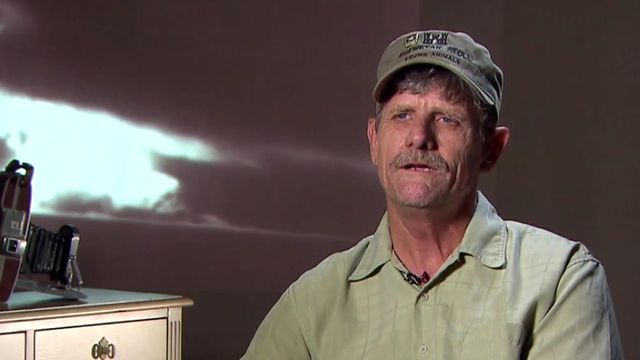Vets who cleaned up nuclear test sites seek extra health benefits
Decades after being sent to one of the most radioactive spots on Earth, many servicemen are now not only battling health problems, they're also fighting Congress to get coverage after years of government denial that they were exposed to dangerous elements.
Posted — UpdatedThe U.S. military used Enewetak Atoll, a tiny ring of coral islands in the Pacific Ocean, about 2,800 miles southwest of Hawaii, to test nuclear bombs in the 1950s. Two decades later, the military sent in about 4,000 troops to decontaminate the islands, mixing radioactive soil and debris with cement, dumping it all in a crater left by one of the bombs and covering everything with a concrete dome.
Durham resident Mike Horton and Terry Hamrick, who lives in Hatteras Village, recall Enewetak as a South Pacific paradise.
"It was beautiful, white coral sands," Horton said.
"The flora, the wildlife underwater was amazing," Hamrick said.
Horton said he learned of the danger of the assignment only after he and other troops took a swim and their commander told them why they were there.
"We were floating in a hole made by an atomic bomb. That's when I started saying, 'Hmm, we might be in a little bit of trouble here,'" he said recently.
"(There was) a lot of radioactivity, radioactive debris, cesium, plutonium, uranium that these troops with no protection scraped off the islands," Horton said, describing the work of the cleanup crews.
"These guys would work six days a week, 12 hours a day," said Hamrick, who removed communication equipment from Enewetak in the latter stages of the operation. "Scraping off the hot islands, they were getting all that dust – the radioactive materials – back up in the air and breathing it."
The men toiled in 100-plus-degree heat with no hazmat suits and no face masks to keep contaminated material off their skin and out of their lungs.
"(They were) basically half naked: short pants, boots," Hamrick said.
Horton said he now suffers from a degenerative joint disease and frequent blood clots. Many of his comrades are dying of cancer, he said.
"So many of my friends are dead. Their families are suffering," he said. "Some of my fellow brothers that served there have cancers, not just one, (but) two, three, four."
"The folks that were there scraping the dirt off every day, they've got some really serious cancers," said Hamrick, who has had treatable skin cancers himself.
The troops who witnessed the nuclear testing in the 1950s, known as "atomic veterans," receive extra health care benefits from the government, including advanced care for 21 types of cancer. But government agencies say troops in the cleanup crews weren't exposed to dangerous levels of radiation and have repeatedly denied extra coverage to them.
Horton and Hamrick are now lobbying Congress to obtain added health coverage for their band of brothers on the cleanup crews.
"It's the right thing to do," Hamrick said. "It will give these veterans, at least in the time that they have left, especially the sickest ones, access to more care and more resources."
According to documents about the Enewetak cleanup that were declassified by President Bill Clinton, troops weren't as protected as the government claimed at the time.
Some badges to measure radiation exposure were damaged, or readings from badges were inaccurate, Horton said. Air samplers had incorrect filters, and urine tests weren't conducted on troops, even though military officials told Congress they were.
"If Congress had known the truth, they would have shut the operation down," he said.
Two bills have been filed in Congress, including one co-sponsored by U.S. Sen. Thom Tillis of North Carolina, that would classify the cleanup crews as atomic veterans. Once that change is made, the Department of Veterans Affairs can provide extra health benefits to them.
"There's guys that suffer far worse than I do – emotionally, financially, physically. It's just an atrocity," Horton said.
"Some of these folks never saw combat, and that's true. But they will die from wounds received, wounds you couldn't see at the time," Hamrick said.
• Credits
Copyright 2024 by Capitol Broadcasting Company. All rights reserved. This material may not be published, broadcast, rewritten or redistributed.





